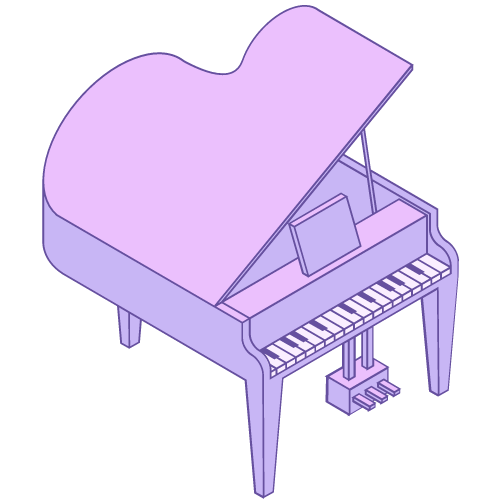Blog
How Playing Piano Can Improve Your Mental Health
The benefits of playing a musical instrument extend far beyond simply learning to play songs or improving musical technique. Playing the piano, in particular, offers a wide range of mental health benefits that can significantly improve your emotional well-being, cognitive function, and overall quality of life. Whether you’re a seasoned pianist or just starting out, the act of playing piano can have profound effects on your mental health.
In this article, we will explore the many ways that playing the piano can contribute to mental health, focusing on its impact on stress reduction, cognitive development, emotional expression, and more.
1. Reduces Stress and Anxiety
One of the most immediate benefits of playing the piano is its ability to reduce stress and anxiety. Playing music has been shown to activate the brain’s relaxation response, which counteracts the body’s fight-or-flight reaction. When you focus on playing, your mind can enter a state of flow, a psychological state in which you are fully immersed in the activity at hand. This helps you to temporarily escape the stresses and worries of everyday life.

How it works:
- Mindfulness: Playing piano requires intense concentration and mental engagement. This focus can act as a form of mindfulness, which has been proven to lower cortisol levels, the hormone associated with stress.
- Relaxation: The act of playing music, particularly slower, more melodic pieces, can help slow the heart rate and lower blood pressure, inducing a feeling of calm and relaxation.
By incorporating regular piano practice into your routine, you can develop a healthy outlet for stress and anxiety, leading to a more balanced mental state.
2. Enhances Cognitive Function and Memory
Playing the piano is a mentally stimulating activity that involves a range of cognitive processes, from memory recall to motor coordination. Studies have shown that playing a musical instrument can have a positive effect on brain function, especially in areas related to memory, attention, and problem-solving.
How it works:
- Memory Improvement: Learning new pieces and memorizing musical scores exercises both short-term and long-term memory. Piano players must remember not only the notes and rhythms but also the fingerings and the nuances of each piece. This can enhance your overall memory capacity.
- Cognitive Flexibility: Playing the piano requires multitasking—reading sheet music, interpreting rhythms, using both hands independently, and adjusting dynamics—all of which engage multiple areas of the brain. This kind of cognitive flexibility can improve your ability to switch between tasks and think critically.
- Neuroplasticity: Regular piano practice has been shown to increase the brain’s ability to form new neural connections, a process known as neuroplasticity. This means that, over time, your brain becomes more adaptable and capable of learning new skills.
In addition to improving memory and cognitive flexibility, playing piano has also been linked to a reduced risk of cognitive decline in older adults. Studies suggest that musicians who play regularly have a higher level of cognitive reserve, which helps protect against age-related cognitive issues such as dementia.
3. Boosts Emotional Expression and Self-Esteem
For many people, music is a powerful form of emotional expression, and the piano offers a unique avenue for communicating feelings that may be difficult to articulate with words. Whether you’re playing a melancholic ballad or an upbeat composition, music allows you to channel emotions such as joy, sadness, frustration, or excitement in a healthy, constructive way.
How it works:
- Emotional Release: Playing the piano can act as an emotional outlet, allowing you to express emotions you may not feel comfortable expressing verbally. The release of emotion through music can help improve your emotional health and stability.
- Self-Esteem Boost: Accomplishing a challenging piece or improving your technique can lead to a significant boost in self-esteem and confidence. The sense of achievement that comes from mastering a piece of music or overcoming a difficult passage can reinforce a positive self-image.
- Mood Regulation: Studies have shown that music has the ability to affect mood and emotional well-being. For many, playing the piano can help regulate emotions and lift their spirits, acting as a natural mood stabilizer.
Additionally, music can evoke nostalgia or memories, which can be both therapeutic and grounding. For some, playing familiar songs from their past may provide a sense of comfort or help in processing difficult emotions.
4. Improves Focus and Concentration
Playing the piano requires intense focus and concentration, which can have a positive effect on other areas of your life. Musicians are constantly required to multitask—reading sheet music, keeping time with a metronome, controlling dynamics, and engaging in hand-eye coordination. These mental demands help to improve your attention span and ability to concentrate.
How it works:
- Enhanced Focus: The ability to remain focused for extended periods while playing piano is a skill that can transfer to other areas of life, such as work, school, and personal relationships. As you improve your ability to concentrate while playing the piano, you may find that your focus improves in other tasks as well.
- Discipline and Patience: Piano practice requires a certain level of discipline, as progress often comes slowly. Learning to be patient with your progress and working diligently toward mastering new pieces can improve your resilience and perseverance.
For many people, the act of sitting down to practice the piano helps them get into a “zone” where they can block out distractions, leading to more productive and focused periods of time.
5. Provides a Sense of Accomplishment and Purpose
For those who feel unfulfilled or lack a sense of purpose, playing the piano can offer a meaningful and rewarding pursuit. Setting goals, working toward those goals, and eventually achieving them can instill a deep sense of satisfaction and accomplishment. Whether it’s learning to play a favorite song, mastering a difficult piece, or performing in front of an audience, each milestone achieved on the piano can contribute to a sense of purpose.

How it works:
- Goal Setting: Setting goals and working toward them is a great way to improve motivation and sense of purpose. Whether your goals are short-term (learning a new song) or long-term (mastering a challenging piece), accomplishing them provides a sense of purpose and personal achievement.
- Creativity and Self-Expression: For those who enjoy composing or improvising, the piano also provides a medium for creativity. Composing music can be a therapeutic process that allows individuals to express their thoughts, feelings, and ideas in an original way. This creative expression can be deeply fulfilling and help enhance mental health.
In essence, the piano can become a meaningful activity that gives individuals a sense of direction and fulfillment, particularly for those who may struggle with feelings of purposelessness.
6. Enhances Social Connection and Reduces Loneliness
While playing the piano is often a solitary activity, it can also provide opportunities for social connection. Whether through lessons, group performances, or simply sharing music with others, the piano can help foster relationships and reduce feelings of loneliness. Music has long been a shared experience in human history, and playing the piano can create a sense of community and belonging.
How it works:
- Group Learning: Piano lessons and group music classes provide an opportunity to meet new people and engage in social interactions. For adults, this can be particularly helpful in combating isolation, as it offers a social outlet and encourages meaningful connections.
- Performance: Whether playing for family and friends or in a public concert setting, performing on the piano allows you to share your skills with others and receive positive feedback. This can improve feelings of self-worth and foster a sense of pride and accomplishment.
Additionally, the shared joy of music can bring people together, creating bonds that help combat feelings of loneliness and isolation.
Conclusion:
The piano is more than just an instrument—it is a powerful tool for improving mental health and well-being. Whether you are looking to reduce stress, enhance cognitive function, express emotions, or build self-esteem, playing the piano offers countless mental health benefits. It provides a means of emotional expression, a sense of accomplishment, and a source of connection with others. Incorporating piano practice into your daily routine can lead to a more balanced, fulfilled, and mentally healthy life.
So, the next time you sit down at the piano, remember that you are not just making music—you are also nurturing your mind and emotional well-being.


